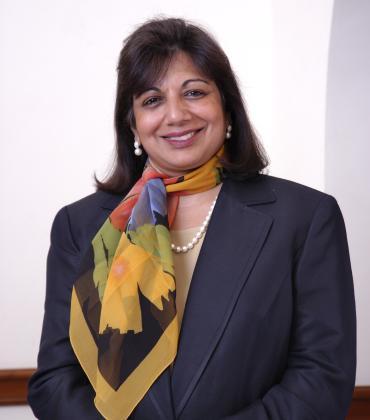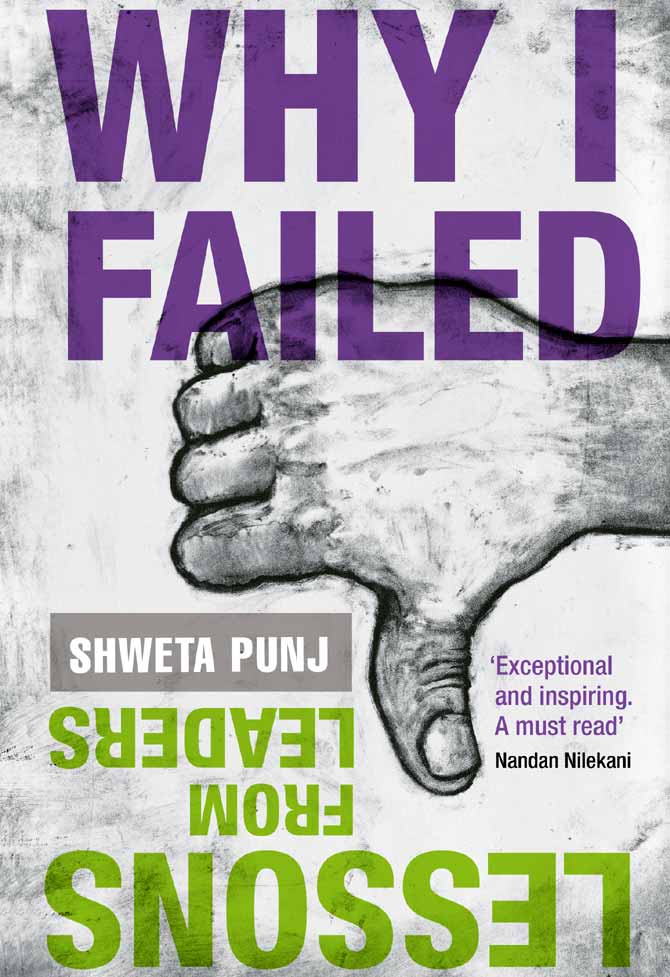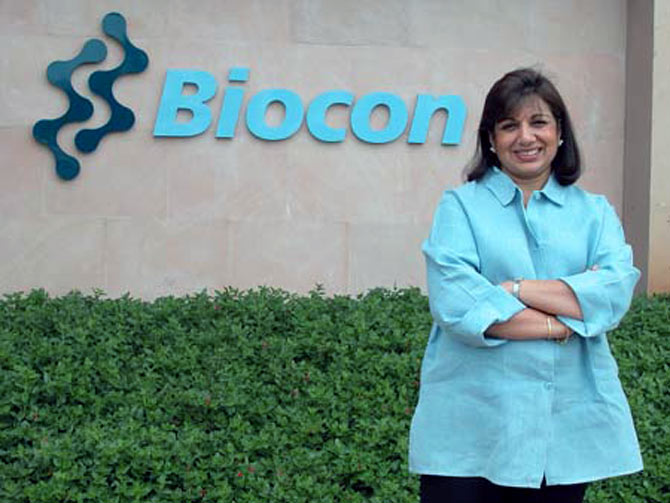 | « Back to article | Print this article |
MUST READ: Failure lessons from Kiran Mazumdar's life
In her debut book Why I Failed: Lessons from Leaders, author Shweta Punj speaks to prominent personalities from across sectors -- entrepreneurs, sportsperson, filmmakers -- who talk about their own failures and how they turned things around.
Here we bring you an excerpt from the chapter on Kiran Mazumdar-Shaw, founder of India’s first and largest biotechnology company, Biocon Ltd. She started Biocon in 1978 to manufacture enzymes because she didn't get a job as a brewer. Her story is one of grit, self confidence and courage:
***
Failure Is Not Final, Giving Up Is
Daughter of a brewmaster and without a job, raising funds for her entrepreneurial venture was not going to be easy.
Mazumdar-Shaw was prepared to fight it out -- she knew she would have to stave off opposition at every step.
Mazumdar-Shaw was trying to build an enterprise in an area that was relatively nascent in India, and the fact that she was a woman and had no family money to fall back on didn’t help either.
She was twenty five at the time. Getting banks to fund her venture was nearly impossible. Banks wanted her father to be a guarantor. And Kiran disagreed on principle.
Being a woman entrepreneur also put her at a disadvantage. But the challenges and setbacks did not hold her back from setting up office with a seed capital of ten thousand rupees -- around four lakh rupees today.
‘There are many examples of failure. I had a huge credibility hurdle to overcome. I failed to get financial support. I failed to recruit people I wanted to. The first fifteen years were all about survival,’ says Mazumdar-Shaw looking back at the initial years of her entrepreneurial life.
Biocon Limited was launched in 1978, in partnership with an Irish Biotechnology company Biocon Biochemicals founded by a first generation Irish entrepreneur Leslie Auchincloss.
The company produced enzymes for alcoholic beverages, paper, and other products.
Growth was slow, as a pioneer Mazumdar-Shaw faced resistance and discrimination from all quarters -- employees didn’t want to work for a woman and investors remained wary of investing in a woman run company.
But Mazumdar-Shaw persevered.
The company started to make profits and almost a decade later, Auchincloss sold his stake in Biocon to Unilever.
Though the challenges of her journey would seem insurmountable to many, Shaw went about slicing her setbacks with almost clinical precision.
She says, ‘You must understand why you are failing. You are failing because your credibility is at stake. You have got to make credibility to ensure people trust you.’
As Mazumdar-Shaw went about building credibility and the company started adding to its bottom line, she also started dreaming bigger. She had understood the scale of her potential and ambition.
She wanted to build a global scale company and for that she would have to go beyond enzymes.
The focus of the business was changed from enzymes to biopharmaceuticals in the nineties. She sold off the enzyme business she had spent fifteen years building, and put in all her energies into the biopharmaceutical business -- where the first batch of enzymes failed.
‘Here I was trying to scale up a home grown biotechnology firm and my first batch failed. We checked why it failed. We identified process failures,’ she says.
Mazumdar-Shaw took the failure in her stride and did not internalize it, a personality trait most women are guilty of.
Years later, Mazumdar-Shaw failed again, this time at her dream project of building oral insulin.
The drug failed to give the desired outcome in the clinical study.
It brought down the glucose levels to desired levels, but failed to lower the haemoglobin count in patients with type 2 diabetes to the desired levels. This came out in the late stage clinical trials.
‘That was a dark hour. I had built the drug with great expectations,’ she laments.
Excerpted from Why I Failed: Lessons from Leaders by Shweta Punj with kind permission from Random House India (Rs 199)
Click here to purchase a copy of Why I Failed: Lessons from Leaders
Please click NEXT to continue reading...
'When I sold my enzyme business, I had given it whatever I could'
The oral insulin drug was again a pioneering effort by an Indian biopharmaceutical company.
There was hype, awe, and immense expectations around it.
But the mountain of expectations did not dwarf Mazumdar-Shaw’s spirit.
Once again, she analysed what went wrong and how they could do better.
A thorough analysis showed a flaw in the design of the study.
‘Let’s be pragmatic about failure,’ she said. ‘If we want to give up this programme, we should. One should be prepared to give up.’
Mazumdar-Shaw had earlier sold off the business that she had spent fifteen years building.
‘When I sold my enzyme business, I had given it whatever I could, and I unlocked very good value.’
Mazumdar-Shaw was ready to walk away again.
In the oral insulin failure, analysis showed that the design of the clinical trial was wrong.
The product was effective but the study results did not meet expectations due to the flaw in the design of the study. Biocon decided to continue the programme with a different study design.
Nearly a year later, in March 2012, Mazumdar-Shaw suffered another setback.
Biocon’s global partner, Pfizer, and Biocon decided to part ways.
A much talked about deal where Biocon was to develop and produce biosimilar versions of insulin and Pfizer was to commercialize the products in global markets, was called off rather abruptly.
Minutes after the announcement of the break-up, Mazumdar-Shaw was quoted as saying, ‘Biocon remains committed to delivering its Biosimilar Insulins portfolio to global markets in its endeavour to make a difference to diabetic patients across emerging and developed economies.
Biocon will continue to work with its existing partners in several markets and will pursue a commercial strategy on its own and through new alliances in other markets.’
Mazumdar-Shaw categorises the Pfizer fallout as a perceived failure.
For Mazumdar-Shaw, calling the deal off was the only logical way forward, but for the analysts and media it was a failure.
Mazumdar-Shaw had failed to take the much talked about partnership forward.
'Pfizer wanted us to renegotiate the deal. I was not willing to. It was early enough for us to part ways,' she says rather matter-of-factly.
There was a change in Pfizer’s business strategy and Biocon didn’t agree with it.
Mazumdar-Shaw did not wait around for the cynics to settle down, in less than a year, Biocon entered into an agreement with Mylan in February 2013 for co-development and marketing of its biosimilar insulin analogue products.
‘We were anyways to develop most of the programmes.’ I said: ‘Let’s do it ourselves. I am sure there are other ways to commercialize the product.’
'Don't take failure personally'
Why I failed
In my initial years, I couldn’t get others to see my vision.
I failed at getting the best talent to work for me during my early years of entrepreneurship.
Pfizer deal fall-out was a perceived failure. We were not looking in the same direction.
Advice
Always distinguish between perceived and real failure.
Break down failure and strategize.
Don’t take failure personally.
Whenever you fail, do not have a knee-jerk reaction.
Deal with failure: There is a learning in every step.


